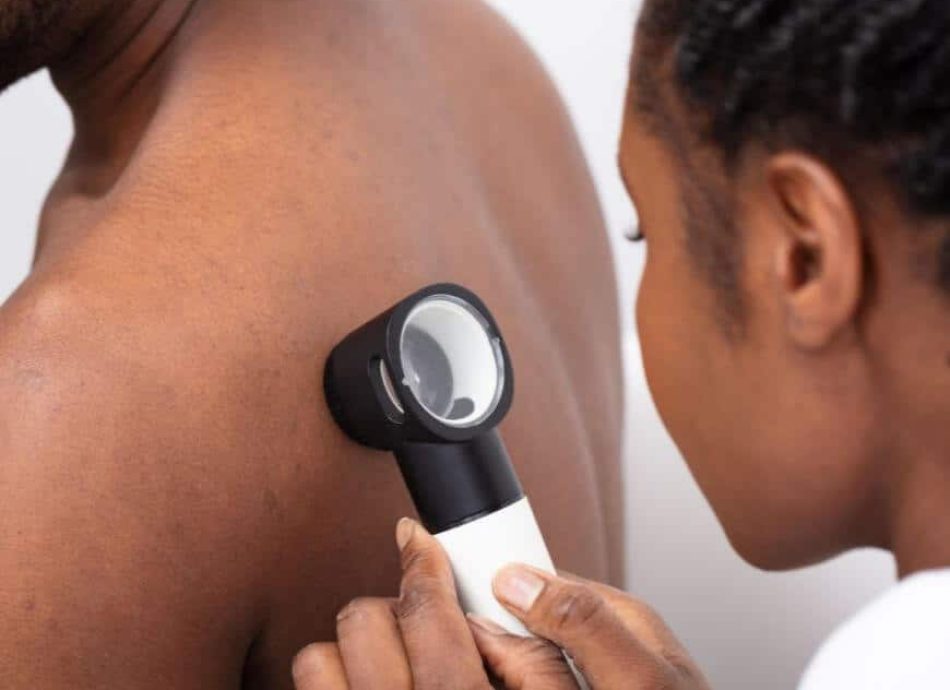Award winning dermatology service, with over 20 years on experience
Short waiting lists, on some occasions offering same week appointments
Safe environment, in Care Quality Commission approved facilities
Conditions we treat
skincare for menopausal skin In Shrewsbury
What is Menopause?
Menopause is a process a woman goes through that marks the end of her reproductive years. During this time, the levels of the hormones estrogen and progesterone decline, leading to a range of physical and emotional changes. These changes can affect various parts of the body, including the skin, bones, heart, and brain.

What happens to the skin during menopause?
Dryness and itchiness
Dry and itchy skin: during menopause, the ovaries stop releasing eggs, periods come to an end, and the production of estrogen begins to decline. Estrogen is a powerhouse hormone. Estrogen stimulates the formation of skin-smoothing collagen oils. As menopause approaches, it is very normal for the skin gets dry and itchy.
Skin Thinning
Skin thinning: The decrease in estrogen levels can also cause a reduction in collagen production, which can lead to thinner, more fragile skin.
Lines and Wrinkles
Lines and wrinkles: Collagen and elastin decrease significantly during menopause. These are essential for the structure, support and elasticity of the skin, and a lack of these connective tissues leads to wrinkles. As the skin becomes thinner and less elastic, wrinkles and fine lines can become more visible.
Age Spots
Age spots: Menopause can also cause an increase in the production of melanin, which can result in the development of age spots and other areas of hyperpigmentation.
Acne
Acne: Some women may experience acne during menopause due to changes in hormone levels. In most cases, prescription medication can clear up menopausal acne. Some women may find success using natural treatment methods.
Sun Damage
Sun damage: As estrogen levels decline, the skin may become more sensitive to the sun’s harmful ultraviolet (UV) rays. This can lead to sunburn, hyperpigmentation, and an increased risk of skin cancer. In addition, some women may be more likely to spend time outdoors during menopause due to changes in their lifestyle or activities, which can increase their exposure to the sun.
Hair Loss & Alopecia
Polycystic Ovary Syndrome
If you suffer from Polycystic Ovary Syndrome (PCOS), you may experience excessive hair growth on your face. This can be frustrating and even affect your confidence. Fortunately, at St Michael’s Clinic, we offer a solution to help manage this symptom. Our Laser Hair Removal treatment has been successful in reducing hair growth by up to 90% in some cases. By using advanced technology to target hair follicles, we can help you achieve smoother, hair-free skin.
Don’t let PCOS interfere with your life, contact us today to learn more about how we can help you. Schedule an appointment today for personalised advice on what treatment would work best for you.
FREQUENTLY ASKED QUESTIONS
WHEN DOES MENOPAUSE START?
WHAT ARE THE SIGNS OF MENOPAUSE?
Hot flashes, night sweats, vaginal dryness, mood swings, and difficulty sleeping are some of the common symptoms of menopause.
HOW SHOULD I TAKE CARE OF MY SKIN DURING MENOPAUSE?
During this phase, it is important to take care of your skin to maintain its health and appearance. While it’s always a good idea to see a dermatologist for personalised advice, here are some general tips: use a gentle cleanser, moisturise regularly, wear sunscreen, and use products with retinoids. Avoid using aggressive exfoliants and having hot showers and baths.
WHY SHOULD I CONSULT A DERMATOLOGIST WHEN ENTERING MENOPAUSE?
There are several reasons why a woman should consider seeing a dermatologist during menopause. Menopause can cause a range of skin changes, including dryness, thinning, wrinkles, age spots, acne, sun damage and hair loss. A dermatologist can help diagnose these skin conditions and provide personalised treatment options to help manage them. A dermatologist can also provide guidance on how to maintain healthy skin during menopause. They can recommend skincare products that are best suited to a woman’s individual needs and advise on lifestyle changes that can help support skin health. Additionally, hormonal changes during menopause can increase the risk of certain skin conditions, such as skin cancer and melanoma. Regular skin exams with a dermatologist can help detect these conditions early when they are more easily treatable.
HOW CAN A MENOPAUSAL SKINCARE CONSULTATION AT STRATUM DERMATOLOGY CLINICS HELP ME?
Seeing a dermatologist during menopause can help women manage a range of skin conditions and maintain healthy skin as they age. Regular skin exams with a dermatologist can also help detect and treat skin cancer and other skin conditions early, when they are more easily treatable.
REQUEST A CALL BACK
Please fill in this form and one of our team will give you a call back to arrange a consultation with one of our expert dermatologists.

HEAR FROM OUR PATIENTS
WHY HAVE A MENOPAUSAL SKINCARE CONSULTATION AT St. MIchael's CLINIC?
At St Michael’s Clinic, we understand the importance of safe and effective skincare, especially during the menopausal stage. That’s why we work with leading experts in the field of dermatology to ensure that our patients receive top-quality treatment and care. Our clinic is regulated by the Care Quality Commission, and we are proud to be part of the British Association of Dermatologists. We are also top-rated by our patients on Doctify, which speaks to our dedication to providing exceptional service. With St Michael’s Clinic, you can trust that you are in good hands for all of your menopausal skincare needs.
